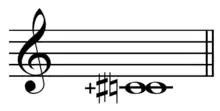
Major limma on C
In music, a major limma is an interval with the ratio of 135:128, which is the difference between two major tones (a ditone) and a minor third. It is equal to about 92.18 cents.
Composer Ben Johnston uses a "−" with a "♭" as an accidental to indicate a note is lowered 92 cents, or a "+" with a "♯" to indicate a note is raised 92 cents, the value of the syntonic comma and the just chromatic semitone.[1]
References
- ↑ Fonville, John (Summer 1991). "Ben Johnston's Extended Just Intonation – A Guide for Interpreters". Perspectives of New Music. 29 (2): 106-137 (109). doi:10.2307/833435. JSTOR 833435.
This article is issued from Wikipedia. The text is licensed under Creative Commons - Attribution - Sharealike. Additional terms may apply for the media files.